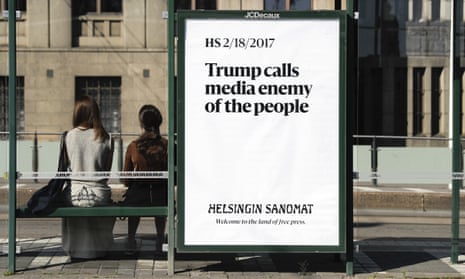More than 100 newspapers across the US will publish coordinated editorial responses to president Donald Trump’s repeated attacks on the media on Thursday.
The campaign has been organised by the Boston Globe, whose editorial staff approached news outlets across the country asking them to write an editorial denouncing the president’s hostility to the media.
“This dirty war on the free press must end,” said the appeal.
“Publications, whatever their politics, could make a powerful statement by standing together in the common defence of their profession and the vital role it plays in government for and by the people.”
As of Saturday, more than 100 publications had signed up to the campaign, Marjorie Pritchard, the Globe’s deputy editorial page editor, told CNN.
The publications include large metropolitan dailies like the Houston Chronicle, Miami Herald and Denver Post through to small weekly newspapers.
Each newspaper will publish their own editorial in their own words on Thursday.
“We propose to publish an editorial on August 16 on the dangers of the administration’s assault on the press and ask others to commit to publishing their own editorials on the same date,” the appeal said.
“Our words will differ. But at least we can agree that such attacks are alarming.”
The campaign has been supported by the American Society of News Editors.
Trump regularly lashes out at news outlets and individual reporters for stories he does not like, accusing them of spreading “fake news”.
The president has come under fire for repeatedly calling the press “the enemy of the people”, including from the outgoing UN human rights commissioner Zeid Ra’ad al-Hussein, who told the Guardian Trump’s anti-press rhetoric was “very close to incitement to violence”.
“We began to see a campaign against the media … that could have potentially, and still can, set in motion a chain of events which could quite easily lead to harm being inflicted on journalists just going about their work and potentially some self-censorship,” Zeid said.
The tensions have been especially acute at Trump’s rallies, where his supporters often jeer at, curse and harass reporters working in a closed-off media pen, sometimes with the apparent support of the president.
Earlier this month, after being loudly heckled at a Trump rally in Florida, CNN’s Jim Acosta asked White House press secretary Sarah Sanders to confirm that she did not think the press were the “enemy of the people”. Sanders refused to give Acosta an answer.
Last month, Trump met with the publisher of the New York Times to discuss the president’s labelling of the press the “enemy of the people”. The president said it had been a “very good meeting”, but just hours later he returned to Twitter to launch a scathing attack on “anti-Trump haters in the dying newspaper industry”.
“The failing New York Times and the Amazon Washington Post do nothing but write bad stories even on very positive achievements,” Trump tweeted. “And they will never change!”
